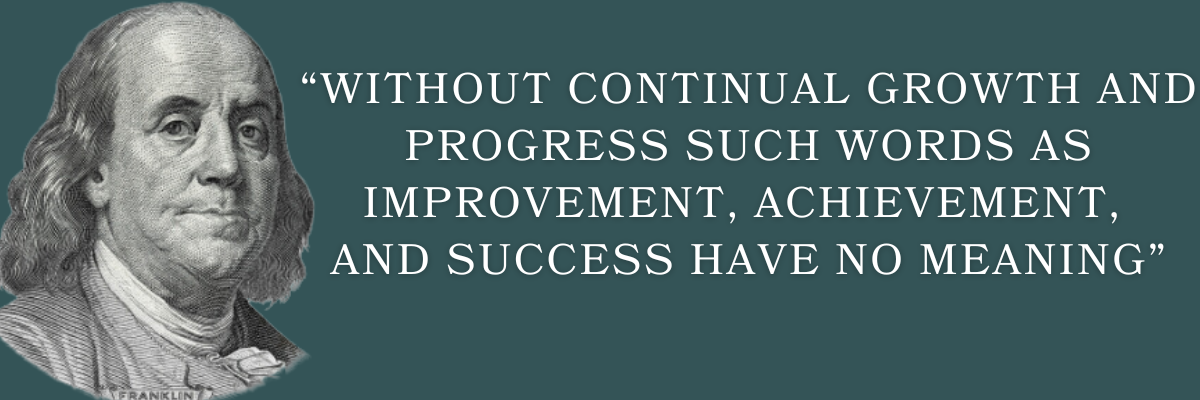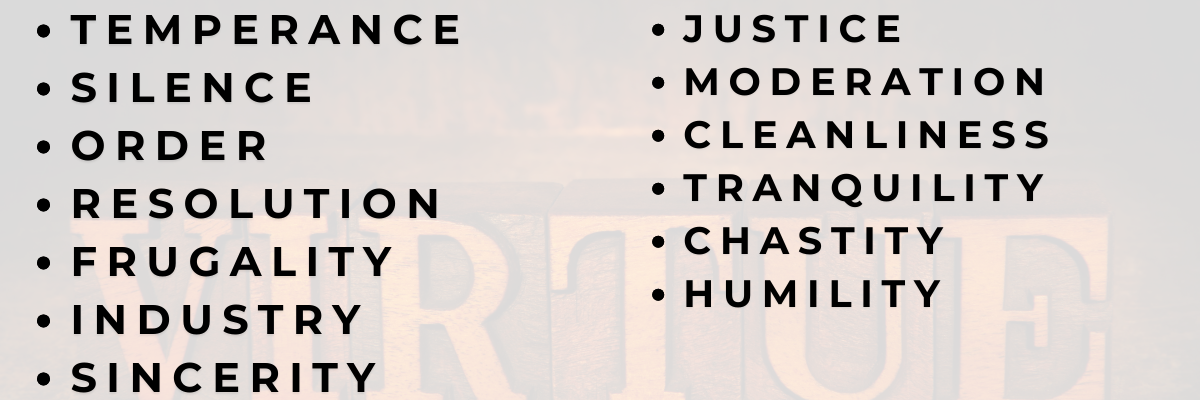
Benjamin Franklin, one of America’s founding fathers, was not only known for his contributions to science and politics but also for his remarkable wisdom in leading a successful life. In his quest for personal improvement, Ben Franklin’s 13 virtues have guided his actions and decisions. These virtues included temperance, silence, order, resolution, frugality, industry, sincerity, justice, moderation, cleanliness, tranquility, chastity, and humility. Each virtue represented a specific character trait that Franklin aimed to cultivate within himself.
Even though these virtues were established in the 18th century, their relevance and impact on achieving success remain timeless. Franklin believed that by embodying these virtues consistently, individuals could attain personal excellence and improve their lives in various aspects. Whether it is in business, relationships, or personal growth, Franklin’s 13 virtues offer valuable insights on how to navigate life with integrity and purpose.
In this article, we will delve into each of these virtues, exploring the profound wisdom they hold and how they can be applied in our modern-day pursuit of success. Join us on this journey as we uncover the timeless wisdom of Benjamin Franklin’s 13 virtues for achieving a fulfilling and purpose-driven life. For a definition of virtue check the article on the “definition of virtues”.
The history and significance of Ben Franklin’s 13 Virtues
Benjamin Franklin’s 13 virtues emerged from his desire for self-improvement and personal mastery during the 18th century. Franklin, born in 1706 in Boston, was a polymath who made significant contributions across various fields, including science, politics, and philosophy. His pursuit of moral and intellectual excellence led him to create a systematic approach for developing his character. Moreover, Franklin meticulously documented his virtues in a list, believing that by focusing on these principles, he could cultivate a better version of himself. This endeavor was not just a personal project; it was a philosophical exploration of what it meant to lead a virtuous and successful life.
The significance of Ben Franklin’s 13 virtues extends beyond his own life. For example, they represent a framework for personal development that remains relevant today. In an era marked by rapid change and complexity, Franklin’s virtues provide timeless guidance for navigating modern challenges. Each virtue encapsulates fundamental qualities that contribute to a well-rounded character, promoting ethical behavior and responsible decision-making. They serve as a reminder that success is not merely a matter of external achievements but is deeply rooted in one’s character and values. By adhering to these principles, individuals can cultivate resilience, integrity, and a sense of purpose in their lives.
Franklin’s approach to virtues was also practical. He designed a system of self-monitoring to track his progress, which involved a chart where he could mark his adherence to each virtue daily. This method reflects his belief in the power of accountability and discipline in personal growth. The virtues were interrelated, supporting one another to create a holistic approach to character development. As we explore each virtue, we will see how they can be applied in various aspects of life, offering a blueprint for success that transcends generations and cultures.
Understanding each of the 13 Virtues

The first virtue, Temperance, emphasizes moderation in all aspects of life, particularly in consumption. Franklin believed that by practicing temperance, one could avoid excesses that lead to negative consequences, whether in eating, drinking, or even in emotional responses. This virtue encourages individuals to develop self-control and make mindful choices, fostering a balanced lifestyle. By applying temperance, people can enhance their well-being and maintain clarity in their thoughts and actions.
Next is Silence, which advocates for the importance of listening and thoughtful communication. Franklin valued silence not merely as the absence of noise but as an opportunity for reflection and learning. By practicing silence, individuals can enhance their understanding of others and develop a deeper sense of empathy. This virtue invites us to think before we speak, ensuring that our words are meaningful and constructive rather than impulsive or harmful. In a world filled with distractions and noise, embracing silence can lead to more profound connections and thoughtful interactions.
Order is the third virtue, emphasizing the importance of organization in both physical and mental spaces. Franklin believed that a well-ordered life leads to increased efficiency and productivity. By establishing systems and routines, individuals can reduce chaos and focus on their goals. This virtue encourages not only the arrangement of external environments but also prioritizing tasks and responsibilities. When order prevails, individuals can cultivate clarity and purpose, making it easier to navigate the complexities of life.
The fourth virtue, Resolution, speaks to the importance of determination and commitment to one’s goals. Franklin understood that success requires not only vision but also the will to see endeavors through to completion. This virtue advocates for decisiveness and the courage to act on one’s intentions. By cultivating resolution, individuals can overcome challenges and obstacles, fostering a sense of agency in their lives. It emphasizes the importance of setting clear goals and being persistent in the pursuit of those objectives.
Following resolution is Frugality, which encourages individuals to wisely manage their resources, particularly financial ones. Franklin believed that frugality was not merely about saving money but about valuing what one has and using it judiciously. This virtue teaches the importance of making informed financial decisions, avoiding wastefulness, and appreciating the value of hard work. For example, by practicing frugality, individuals can secure their financial future and create opportunities for growth, ultimately leading to greater stability and success.
The sixth virtue, Industry, emphasizes the value of hard work and diligence in all endeavors. Franklin believed that success is often a direct result of effort and perseverance. This virtue encourages individuals to be proactive, take initiative, and consistently strive for excellence. By embracing industry, people can cultivate a strong work ethic that not only leads to personal achievements but also contributes positively to their communities. It serves as a reminder that sustained effort often yields fruitful results.
Sincerity, the seventh virtue, underscores the importance of honesty and authenticity in interactions with others. Franklin advocated for genuine communication, believing that sincerity fosters trust and strengthens relationships. This virtue encourages individuals to be true to themselves and others, avoiding deceit and pretense. By practicing sincerity, individuals can create meaningful connections, enhancing their social and professional networks. It emphasizes that integrity is foundational to building lasting relationships that contribute to success.
The eighth virtue, Justice, highlights the significance of fairness and moral integrity in one’s actions. Franklin believed that individuals should treat others with respect and uphold ethical standards in their dealings. Moreover, this virtue calls for accountability and responsibility, encouraging individuals to stand up for what is right. By practicing justice, people can contribute to a more equitable society, fostering goodwill and cooperation in their communities. It serves as a reminder that success should not come at the expense of others.
Moderation, the ninth virtue, advocates for balance in all areas of life. Franklin understood that extremes can lead to negative consequences, whether in emotions, behavior, or consumption. This virtue encourages individuals to find a middle ground, promoting a lifestyle that avoids excess and deficiency. By practicing moderation, people can achieve greater harmony in their lives, leading to improved well-being and satisfaction. It serves as a reminder that a balanced approach often leads to long-term success and fulfillment.
The tenth virtue, Cleanliness, emphasizes the importance of maintaining a tidy and organized environment. Franklin believed that cleanliness reflects discipline and fosters a sense of pride in one’s surroundings. This virtue extends beyond physical cleanliness to encompass mental and emotional clarity as well. By embracing cleanliness, individuals can create a more conducive environment for productivity and creativity, enhancing their overall quality of life. It serves as a reminder that a clean space often leads to a clear mind.
Tranquility is the eleventh virtue, advocating for inner peace and composure amid life’s challenges. Franklin recognized that stress and anxiety could hinder success, making it essential to cultivate a sense of calm. This virtue encourages individuals to develop coping strategies and mindfulness practices that promote emotional well-being. By practicing tranquility, individuals can navigate difficulties with grace, maintaining focus on their goals. It serves as a reminder that a peaceful mind is often more effective in achieving success.
The twelfth virtue, Chastity, speaks to the importance of self-control in matters of intimacy and relationships. Franklin believed that temperance in personal relationships fosters deeper connections and mutual respect. This virtue encourages individuals to approach relationships with integrity and responsibility, avoiding impulsive decisions that may lead to regret. By practicing chastity, individuals can cultivate healthier relationships built on trust and understanding, contributing positively to their overall success.
Finally, the thirteenth virtue, Humility, emphasizes the importance of recognizing one’s limitations and being open to learning from others. Franklin understood that arrogance could cloud judgment and impede personal growth. This virtue encourages individuals to remain grounded, acknowledging the contributions of others while striving for self-improvement. By embracing humility, individuals can foster a growth mindset, leading to continuous learning and development. It serves as a reminder that true success is not about superiority but about collaboration and mutual respect.
Applying Virtues in your daily life
Integrating Benjamin Franklin’s 13 virtues into daily life begins with self-awareness and intentionality. The first step is to reflect on each virtue and consider how it aligns with personal values and goals. Creating a personal mission statement that incorporates these virtues can serve as a guiding framework for decision-making and behavior. Individuals can start by selecting a few virtues that resonate most with them, setting specific intentions on how to embody these qualities in their daily actions. This thoughtful approach encourages a deeper connection with each virtue, facilitating a more meaningful practice.
Developing a routine that reinforces these virtues is essential for lasting change. Individuals can dedicate time each day to practice the virtues they wish to cultivate, whether through meditation, journaling, or guided reflection. For example, setting aside a few minutes each morning to contemplate the virtue of Temperance can inspire mindful choices throughout the day. Additionally, creating reminders, such as visual cues or affirmations, can keep these virtues at the forefront of one’s mind, encouraging consistent practice. This routine not only builds discipline but also fosters a sense of accountability in the journey towards personal improvement.
Another effective way to apply Ben Franklin’s 13 virtues is through goal-setting and tracking progress. Individuals can create a chart similar to Franklin’s original system, where they can mark their adherence to each virtue daily. This visual representation serves as a powerful motivator, highlighting areas of success and identifying opportunities for growth. By setting specific, measurable goals related to each virtue, individuals can create a clear roadmap for their personal development efforts. Regularly reviewing these goals and reflecting on experiences can enhance self-awareness and provide insights into the application of Franklin’s virtues in everyday life.
The impact of Virtues on personal growth and success

The impact of Ben Franklin’s 13 virtues on personal growth is profound and multifaceted. By incorporating these principles into daily life, individuals can foster a strong sense of self-discipline, which is crucial for achieving long-term goals. For instance, practicing Industry encourages a diligent work ethic, leading to increased productivity and accomplishment. As individuals consistently apply these virtues, they develop a resilient mindset that empowers them to overcome challenges and setbacks. This resilience is a key factor in personal growth, enabling individuals to learn from failures and adapt their approaches in pursuit of success.
Moreover, the virtues promote a greater sense of purpose and alignment with one’s values. By embracing Sincerity and Justice, individuals cultivate authenticity and ethical behavior, leading to deeper relationships and a more fulfilling life. As they embody these virtues, they often find themselves attracting like-minded individuals who share similar values, fostering supportive communities that further enhance personal growth. This alignment between actions and values creates a positive feedback loop, reinforcing the desire to continue practicing these virtues and striving for excellence.
Ben Franklin’s 13 virtues also contribute to improved emotional intelligence, which is vital for personal and professional success. Practicing Tranquility allows individuals to manage stress effectively, promoting emotional well-being and clarity of thought. This emotional resilience enhances decision-making and interpersonal skills, leading to more successful interactions in both personal and professional settings. As individuals navigate relationships with Humility and Cleanliness, they create environments of respect and collaboration, enhancing their influence and effectiveness. Ultimately, the virtues serve as a foundation for personal transformation, equipping individuals with the tools necessary for sustained success and fulfillment.
Examples of individuals who have embraced Ben Franklin’s 13 Virtues
Throughout history, numerous individuals have embodied the principles outlined in Ben Franklin’s 13 virtues, showcasing their timeless relevance. One notable example is Mahatma Gandhi, who exemplified the virtues of Sincerity and Justice in his pursuit of social change and equality. Gandhi’s commitment to non-violence and truthfulness resonated deeply with Franklin’s ideals. He demonstrated the power of integrity in leadership, inspiring millions to advocate for justice and human rights. Gandhi’s life serves as a testament to how these virtues can drive positive change and foster a sense of purpose.
Another prominent figure is Oprah Winfrey, whose journey from adversity to success reflects the virtues of Industry and Frugality. Winfrey’s relentless work ethic and ability to overcome challenges are evident in her rise to become a media mogul and philanthropist. She embodies the principle of Temperance by maintaining balance in her personal and professional life. Her commitment to giving back to the community aligns with Justice, as she advocates for equality and empowerment. Winfrey’s life exemplifies how embracing these virtues can lead to extraordinary accomplishments while positively impacting society.
Albert Einstein, known for his groundbreaking contributions to science, also exemplified several of Ben Franklin’s 13 virtues. His thirst for knowledge and Industry led to revolutionary discoveries that changed the course of physics. Despite his fame, Einstein remained humble and approachable, embodying the virtue of Humility. His emphasis on creativity and innovation reflects the principle of Resolution, as he persisted in his pursuits despite challenges. Einstein’s legacy illustrates how the application of these virtues can lead to lasting success and influence across various fields.

Tips for incorporating Ben Franklin’s 13 Virtues into your routine
Incorporating Ben Franklin’s 13 virtues into daily life requires intentionality and a proactive approach. One effective strategy is to start small by selecting one or two virtues to focus on each week. By narrowing the focus, individuals can dedicate their energy to truly embodying those principles. For example, if one chooses to emphasize Resolution and Tranquility, they can set specific goals related to these virtues, such as committing to a daily meditation practice or developing a plan to tackle a challenging project. This gradual approach fosters a sense of accomplishment and builds momentum for further growth.
Creating a supportive environment is essential for successfully integrating these virtues. Surrounding oneself with like-minded individuals who value personal development can enhance motivation and accountability. Joining groups or communities that emphasize ethical living, self-improvement, or professional growth can provide valuable support and encouragement. Engaging in discussions and activities centered around Franklin’s virtues can also deepen understanding and commitment to these principles. By fostering connections with others on similar journeys, individuals can share insights and experiences, enriching their practice.
Additionally, leveraging tools and resources can aid in the incorporation of Ben Franklin’s 13 virtues into everyday life. Utilizing journals or apps to track progress and reflect on experiences can enhance self-awareness and accountability. Setting aside time for regular reflection allows individuals to assess their adherence to the virtues and identify areas for improvement. Reading books or attending workshops focused on personal development and ethical living can also provide fresh perspectives and strategies for applying these principles. By actively engaging with supportive resources, individuals can create a more structured and enriching practice of Franklin’s virtues.
Common challenges and how to overcome them when practicing Ben Franklin’s 13 Virtues
While striving to embody Ben Franklin’s 13 virtues, individuals may encounter various challenges along the way. One common obstacle is the temptation to revert to ingrained habits that contradict these principles. For instance, maintaining Temperance can be difficult in social situations where indulgence is prevalent. To overcome this challenge, individuals can prepare in advance by setting clear intentions for their behavior and identifying strategies for navigating tempting situations. Practicing self-awareness and recognizing triggers can empower individuals to make conscious choices that align with their goals.
Another challenge is the potential for burnout when striving for perfection in practicing these virtues. Individuals may become overly critical of themselves, leading to frustration or discouragement. To address this, it is essential to adopt a compassionate mindset and recognize that growth is a gradual process. Embracing the idea that setbacks are part of the journey can foster resilience and encourage individuals to keep striving for improvement. Setting realistic expectations and celebrating small victories can help maintain motivation and a positive outlook on the journey toward personal growth.
Lastly, external influences, such as societal pressures or negative relationships, can hinder the practice of Ben Franklin’s 13 virtues. To navigate these challenges, individuals can cultivate a strong sense of purpose and surround themselves with supportive individuals who share similar values. Establishing boundaries with toxic influences and prioritizing relationships that encourage growth can create a more conducive environment for embracing these virtues. Additionally, seeking mentorship or guidance from individuals who exemplify these principles can provide valuable support and inspiration for overcoming challenges in the pursuit of personal excellence.
Resources and tools to support your journey with Ben Franklin’s 13 Virtues
Embarking on the journey of integrating Benjamin Franklin’s 13 virtues into daily life can be greatly enhanced by utilizing various resources and tools. One of the most accessible tools is journaling, which provides a platform for reflection and self-assessment. Individuals can create a dedicated journal for tracking their progress, recording experiences related to each virtue, and reflecting on lessons learned. This practice not only fosters self-awareness but also allows individuals to celebrate their successes and identify areas for improvement. Journaling can serve as a powerful tool for reinforcing commitment to the virtues.
Additionally, there are numerous books and online courses dedicated to personal development and ethical living that align with Franklin’s principles. Reading literature that explores character development, mindfulness, and effective communication can provide valuable insights and strategies for embodying the virtues. Online platforms such as Coursera or Udemy offer courses on personal growth, leadership, and emotional intelligence, which can further equip individuals with the knowledge and skills needed to practice Franklin’s virtues effectively. Engaging with these resources can deepen understanding and provide practical applications for daily life.
Joining communities or networks focused on personal development can also provide support and encouragement in the journey with Franklin’s virtues. Many organizations and online forums promote ethical living, mindfulness, and self-improvement, fostering connections with like-minded individuals. Participating in discussions, workshops, or group activities centered around these principles can create a sense of accountability and inspire continued growth. By leveraging these resources and engaging with supportive communities, individuals can enhance their practice of Franklin’s virtues and cultivate a fulfilling and purpose-driven life.

Conclusion: Embracing Ben Franklin’s 13 Virtues for a successful and fulfilling life
In conclusion, Benjamin Franklin’s 13 virtues offer a timeless blueprint for achieving personal excellence and success in various aspects of life. Each virtue encapsulates essential qualities that contribute to character development, resilience, and ethical living. By understanding and applying these principles, individuals can navigate the complexities of modern life with integrity and purpose. The virtues serve as a reminder that success is not solely defined by external achievements but is deeply rooted in one’s character and values.
Embracing Franklin’s virtues requires intentionality and commitment, but the rewards are profound. As individuals cultivate self-discipline, authenticity, and a sense of purpose, they can create deeper connections with others and foster a more fulfilling life. The impact of these virtues extends beyond personal growth; they contribute to the betterment of communities and society as a whole. By embodying these principles, individuals can inspire others and create a ripple effect of positive change.
Ultimately, the journey of integrating Franklin’s 13 virtues into daily life is a lifelong endeavor that requires patience, reflection, and growth. By remaining open to learning and embracing the challenges that arise, individuals can continue to evolve and thrive. As we honor the legacy of Benjamin Franklin, let us commit ourselves to embodying these virtues, empowering ourselves and those around us to lead successful and fulfilling lives. For a complete biography on the life of this great man check the History Website.





 – Marcus Aurelius
– Marcus Aurelius